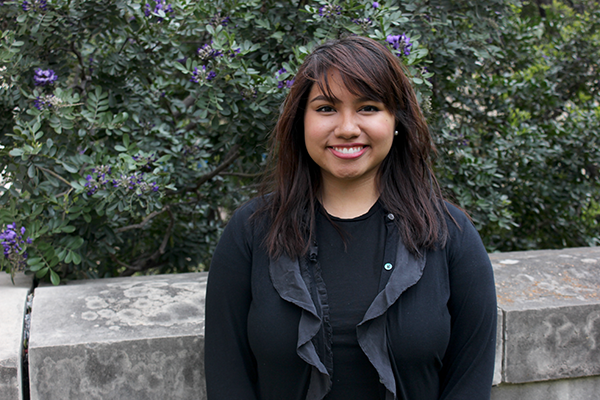One in 5 Americans lives with a mental health condition, according to the National Alliance on Mental Illness.
Joanne Sanchez, a UT Austin psychology junior, is interning with the Texas chapter of NAMI, the largest grassroots organization dedicated to improving the lives of people with mental illness in the country.
Since January, Sanchez has worked 11 hours per week as a NAMI public policy intern. She first learned of the opportunity after Greg Hansch, NAMI’s Texas public policy director, presented at a meeting on campus.
“I was familiar with NAMI’s work in supporting families affected by mental illness through their programs like NAMI Basics,” Sanchez said. “I have a profound interest in the right to mental health care, and last semester I became more aware about the societal structures that prevent access to care.”
In her role as a public policy intern, Sanchez has worked on tasks like updating NAMI stakeholders on mental health policy, contributing to the creation of the 2018-2019 NAMI Texas Public Policy Platform and helped prepare for events around Texas. Additionally, she serves as a NAMI Texas representative for meetings with Austin-based coalitions and Texas Health and Human Services. It’s a lot to juggle—topics NAMI Texas covers range from mental health care parity, to jail diversion, to access to medication.
“Things are constantly changing and new information has to be updated often,” Sanchez says.
In just a few months, she’s already attended meetings for Hurricane Harvey victims and their access to mental health care, the Children’s Health Coverage Coalition where Medicaid benefits are discussed and the Behavioral Health Advisory Committee at Health and Human Services.
Sanchez says her favorite internship experience so far was attending a special education stakeholders meeting.
“Run by a bureaucrat in the Texas Education Agency, the meeting was a great example of the interplay between community advocates and government officials in moving forward a stagnant agenda,” Sanchez says.
That type of firsthand experience can be invaluable to students in their future professional lives. Internships provide students with experiential learning that complements the learning they do inside a classroom.
“My psychology courses tend to focus more on the micro-scale therapeutic approach to mental health care in an individual,” Sanchez said. “This internship is exposing me to other macro-scale ways to contribute to the mental health movement. I’ve been learning about mental health policy, but I’ve realized I’m also interested in program dissemination and implementation.”
Those newly developed interests could guide Sanchez to her next path following graduation.
“My interests in mental health program dissemination and implementation in low-resource settings would benefit from an experience like the Peace Corps,” she said. “I’m thinking of eventually entering a global mental health program in higher education. I’ll see where my career and research interests guide me from there—I might want to pursue therapy as a psychologist too, but I’ll see where my passions are then.”
For other students interested in experiential learning, Sanchez has some advice.
“I recommend doing the Bridging Disciplines Program,” she said. “I’m completing the Social Inequality, Health, and Policy certificate, with a concentration in migration and diaspora. This is an interdisciplinary certificate that requires you complete connecting experiences, which can be an internship or academic research. They give amazing scholarships, one of which I’m hoping to apply for to fund an independent research project on mental health interventions in Chile next fall.”
To learn more about finding or supporting internships in the College of Liberal Arts, visit the Frontiers internships page.
